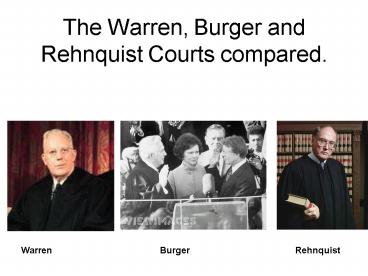The Warren, Burger and Rehnquist Courts compared. PowerPoint PPT Presentation
1 / 19
Title: The Warren, Burger and Rehnquist Courts compared.
1
The Warren, Burger and Rehnquist Courts compared.
Warren
Burger
Rehnquist
2
President Eisenhower appointed Earl Warren
(1953-69) President Nixon appointed Warren
Earl Burger (1969-1986) President Reagan
appointed William Rehnquist (1986-2005)
3
Earl Warren
- Formerly Governor of California
- Chief Justice (1953 -1969)
- A Loose Constructionist
- Promoted judicial activism
- (the courts should have a role
- In shaping government policy
- especially regarding sensitive
- social issues)
4
Seen as too liberal by many conservatives, there
were calls to remove Earl Warren from his
post. He also headed the investigation in to
the assassination of President Kennedy which
produced the famous Warren Commission report.
5
Evaluation of the Warren Court
- Why would conservatives have reacted negatively
to the overall record of the Warren Court ? - Did the Warren court take the concept of judicial
activism too far or did it address long overdue
issues of legal reform ?
6
Negative conservative reactions.
- The Warren Court kick-started the civil rights
movement in 1954 with Brown vs Board of
Education. - Criticised as protecting the rights of criminals
at the expense of law enforcement. - Maintained a strict separation of church and
state over religion prayer in public schools.
Would have alienated conservative Christians.
7
Judicial activism taken too far ?
- Warren Court made some highly political
judgements which displeased conservatives but
pleased liberal reformers. - President Nixon promised in the 1968 election to
appoint more strict constructionists to the court
to redress the balance.
8
Warren E. Burger
- Active Republican
- 1955, President Eisenhower appointed Burger to
the U.S. Court of Appeals for the District of
Columbia. - Appointed by Nixon as Chief Justice
- "He left his mark on every facet of our judicial
system," said Associate Justice Sandra Day
O'Connor, who noted he was "kind and considerate"
to her from her first day on the court, when he
led her by the arm to face "the battery of
press." - She noted that he wrote more than 250 opinions,
including landmark decisions that enhanced
women's rights and strengthened the
constitutional separation of powers. - Supreme Court Chief Justice William Rehnquist,
who succeeded Burger said, "I expected him to be
stiff and formal, as I expected all chief
justices were. I could not have been more wrong."
9
The Burger Court
- Nixon had wanted a more conservative court.
- The Democrat controlled Senate rejected two of
his nominees (Haynesworth And Carswell) as too
conservative. - Burger was an active Republican supporter and
seen as a conservative successor to Warren but he
did not reverse the direction of the court.
10
Going off the reservation
- Presidents do not always get the Supreme Court
justices they expect. - The Burger Court passed Roe v Wade with a 7-2
majority. It also ruled against the death
penalty in furman v Georgia. Burger was
conservative on gay rights. - The court also upheld affirmative action cases
(University of California v Baake in 1978) - The Court also forced Nixon to hand over the
Watergate tapes secret phone recordings made by
Nixon during the Watergate Scandal.
11
- Which of the Burger Court rulings can be
characterised as loose constructionist ? - Roe v Wade (interpreting the 14th Amendment right
to privacy) - Furman v Georgia (interpreting the 8th Amendment
ban on cruel and unusual punishments
12
How contradictory was the Burger Court ?
- How?
- Showed loose constructionism and judicial
activism. - However it made some conservative rulings.
- Why the contradiction ?
- Judges follow judicial reasoning and can set
aside their political beliefs. - The court always looks at past decisions or
precedent (called stare decisis in Latin) and
amicus curiae (evidence submitted by interest
groups) - Public opinion shifted to the right in the late
70s and early 80s. The Supreme Court seems to
have responded to this.
13
The Rehnquist Court
- Reagan was determined to mould a truly
conservative court after the disappointment of
the Burger Court - He appointed Rehnquist after Burgers retirement
in 1986. - Rehnquist is seen as the most conservative
Justice of recent times.
14
Bush v Gore in 2000
Hanging Chads
15
The Rehnquist Court in 2001
- Ronald Reagan (R) appointed - 4
- George Bush (R) Senior appointed 2
- Gerald Ford (R )appointed 1
- Bill Clinton (D) appointed 2
- Since Rehnquists death in 2005 George W Bush (R)
has appointed 2 (C.J. Roberts and Samuel Alito) - See page 154 of Duncan Watts
16
Limits on the Supreme Court
- The Supreme Court is always influenced by past
rulings or precedents (as are British courts) - These are often referred to by the Latin term
stare decisis (stand by things decided). - A past precedent seen as impossible to ignore is
called a super-precedent or super stare
decisis.
17
"when you talk about judges who would change the
right of a woman to choose, overturn Roe vs.
Wade, I think confirmation (to the Supreme Court)
is unlikely. Republican Senator Arlen Specter,
Senate Judiciary Committee
18
Some limits on the Supreme Court
- The Supreme Court has no enforcement powers of
its own. - The court can only judge cases brought before it.
It cannot seek out cases of its initiative. - It depends on its prestige and moral authority
for its rulings to be obeyed. - A too politically biased court would lose
respect, credibility and therefore compliance. - The Supreme Court in the Brown case was out of
step with public opinion and the ruling needed
federal troops to be enforced
19
Comparison of the Warren, Burger, Rehnquist courts

